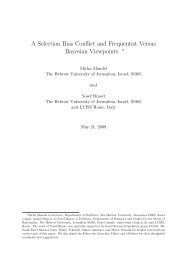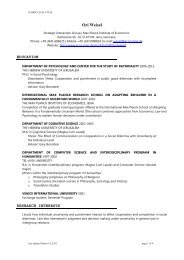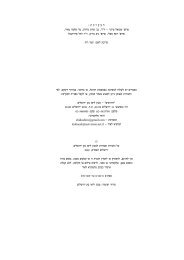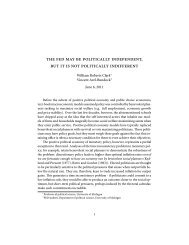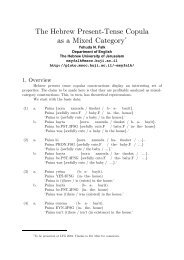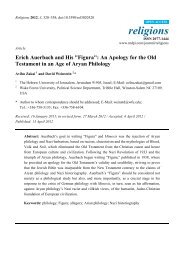Transitive verbs with non-accusative alternation in ... - Pluto Huji Ac Il
Transitive verbs with non-accusative alternation in ... - Pluto Huji Ac Il
Transitive verbs with non-accusative alternation in ... - Pluto Huji Ac Il
You also want an ePaper? Increase the reach of your titles
YUMPU automatically turns print PDFs into web optimized ePapers that Google loves.
74<br />
Rivka Halevy<br />
an atelic read<strong>in</strong>g. Compare, e.g. the ca<strong>non</strong>ical <strong>accusative</strong> construction of the<br />
telic verb tsavat ‘p<strong>in</strong>ch’ (26a) <strong>with</strong> the imperfective and atelic <strong>in</strong>terpretation<br />
of (26b) that conta<strong>in</strong>s the coreferential dative clitic le-. 13<br />
(26) a. ziser tsavat me’at m<strong>in</strong> ha-lexem, hispig ‘oto<br />
Zisser p<strong>in</strong>ched a-little from the-bread, dipped OM-3 MASC.SG<br />
ba-šemen ... ve-hibi’a ‘et haš’arato (elicited example)<br />
<strong>in</strong>-the-oil … and-expressed OM hypothesis-his<br />
‘Zisser p<strong>in</strong>ched off a bit of the bread, dipped it <strong>in</strong> the oil, and<br />
expressed his hypothesis’<br />
(26) b. ziser tsavat lo me’at m<strong>in</strong> ha-lexem,<br />
Zisser p<strong>in</strong>ched to-him (DAT.CLIT) a-little from the-bread,<br />
hispig ‘oto ba-šemen… ve-hibi’a ‘et<br />
dipped OM– 3 MASC.SG <strong>in</strong>-the-oil … and-expressed OM<br />
haš’arato (Beer 1987: 29)<br />
hypothesis-his<br />
‘Zisser p<strong>in</strong>ched himself off a bite of the bread, dipped it <strong>in</strong> the oil<br />
…and then expressed his hypothesis’<br />
However, aspectual mean<strong>in</strong>g cannot be accounted for solely by the verb<br />
and its construal. Other clausal elements play a role, too. In (27), the<br />
aspectual read<strong>in</strong>g h<strong>in</strong>ges on the secondary <strong>verbs</strong> himšix (‘cont<strong>in</strong>ued’), and<br />
<strong>in</strong> (28) on the presence of adjuncts <strong>in</strong> comb<strong>in</strong>ation <strong>with</strong> an <strong>in</strong>gressive verb,<br />
e.g. qam kedey ‘rose to/<strong>with</strong> an <strong>in</strong>tention to’:<br />
(27) ha-'ilem himšix laxbot ba-na'ar še-haya<br />
the-mute cont<strong>in</strong>ued to-beat <strong>in</strong>-the-boy who-was<br />
'axšav saru'a 'al ha-'arets (Kerrett, p. 16) (class 1)<br />
now stretched-out on the-ground<br />
‘The mute went on beat<strong>in</strong>g the boy who was now stretched out on<br />
the ground’<br />
(28) s<strong>in</strong>en li'or ve-qam mi-mqomo kedey l<strong>in</strong>gos<br />
muttered Lior and-rose from-place-his <strong>in</strong>-order to-bite<br />
ba-šezif (Kerrett, p. 28) (class 6)<br />
<strong>in</strong>-the-plum<br />
‘Muttered Lior and rose to bite the plum’<br />
Imperfect forms, such as the present participle, e.g. maxziq ‘be<strong>in</strong>g <strong>in</strong> a<br />
position of hold<strong>in</strong>g’ <strong>in</strong> (29) below, and mexatex ‘was cutt<strong>in</strong>g’ <strong>in</strong> (30),<br />
constitute yet another grammatical device <strong>in</strong> Hebrew for portray<strong>in</strong>g a vivid



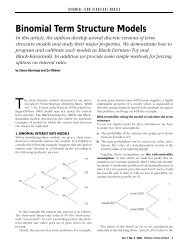
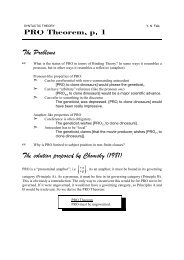
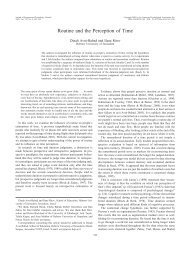
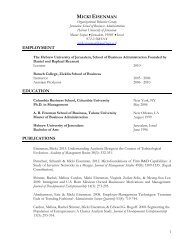
![CV [PDF] - Pluto Huji Ac Il](https://img.yumpu.com/18174585/1/190x245/cv-pdf-pluto-huji-ac-il.jpg?quality=85)
